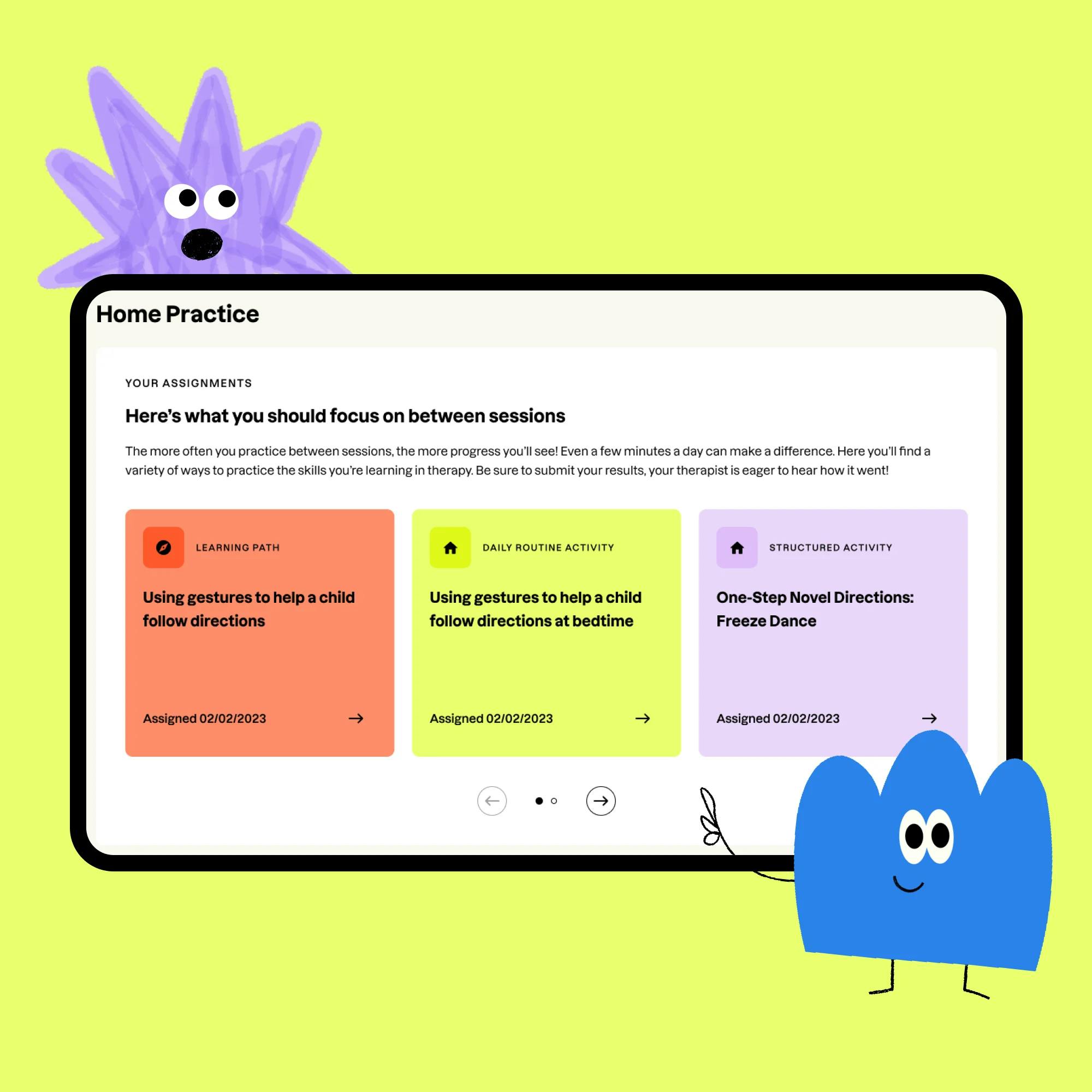Can you do speech therapy for your child at home? If you think your child might have a speech or language delay, you’re probably looking for ways to help them. That might include watching videos or doing research online.
The truth is that speech therapy can’t be done by anyone other than a licensed speech-language pathologist, also known as a speech therapist. It’s extremely important for a child with a communication delay to be under the guidance of a treating speech therapist.
However, this doesn’t mean that there aren’t things families can (and should!) do at home for a child’s speech. They simply need to be done alongside formal speech therapy. Here at Expressable, we are experts in coaching parents and caregivers to support their child or at home, between sessions.
Let’s talk about why professional speech therapy is so important, why apps and YouTube videos can’t replace speech therapy, and how you can help get your child the support they need.
Looking for a speech therapist?
Teletherapy makes it easy. We serve families with a range of speech, language, and feeding needs across the U.S. Get started today!
 Find a speech therapist
Find a speech therapistWhy can't speech therapy be done yourself?
One of the biggest reasons speech therapy can’t be done without a speech therapist is the importance of receiving the right diagnosis. If a parent tries to self-diagnose and treat a communication disorder, it’s likely that they may misdiagnose.
For example, maybe the parent thinks their child has an articulation delay because they barely speak, and when they do, they’re hard to understand. In reality, the child may have an expressive language disorder.
The treatments for these disorders aren’t the same. The parent may try to help the child with pronunciation, when the child actually needs help with the building blocks of language development, which come before specific speech sounds. For the child to make progress, those needs would have to be addressed. Even more significantly, the delay or disorder could worsen because the child would not be receiving proper care.
Even more significantly, the delay or disorder could worsen because the child would not be receiving proper intervention.
A licensed speech therapist is also qualified to verify that a delay or disorder is truly present. In some cases, parents might suspect their child has a speech delay when the child is actually right on track.
For example, it isn’t uncommon for parents to wonder why their 1-year-old isn’t using sentences, or worry that it’s hard for most people to understand their 2-year-old. In actuality, those skills aren't expected at that age. Seeing a speech therapist to rule out a communication disorder can be just as helpful as identifying one!


Can speech therapy apps and videos be used in place of speech therapy?
You may be thinking, “I see so many videos and apps for helping kids learn to talk. Can I use them?”
This is a great question! There are a variety of online speech resources available to parents today. YouTube videos and apps that focus on teaching vocabulary, singing songs, and imitating speech sounds seem to be everywhere. While you should be conscious of your child’s screen time, these aren’t inherently bad. They simply shouldn’t be used as a replacement for therapy.


If your child is watching a video focused on speech, you may see them start to imitate what they hear and see. Let’s say your toddler starts saying “Milk!” when they see milk on the screen. This is great! But imitating the word “milk” from a screen, compared to saying “Milk!” when they want to request a drink, are very different skills.
Kids may be more quick to say things they see on a screen rather than to use these words functionally in everyday life. Speech therapy is focused on functional communication: helping your child communicate what they need, want, and feel day to day, in different situations.
Imitating the word “milk” from a screen, compared to saying “Milk!” when they want to request a drink, are very different skills.
You may also find tips online for practicing speech and language at home. Expressable offers a comprehensive library of articles and teaching videos ourselves. That’s because we strongly support parent education and involvement, and we know that home practice, between sessions, is essential for children to make progress. But the key words there are “between sessions.” Home practice should be done under the guidance of a speech therapist who knows your child and their needs.
Curious or concerned?
Our free screener is tailored by age and covers all areas of speech, language, and feeding. Find out if your child might need speech therapy.
 Screener for children
Screener for childrenThink about it like this. Perhaps you notice that your child uses single words but doesn’t speak in longer phrases. You research online and find tips for helping your child say 3- to 4-word phrases. But in reality, your child may not be ready for that, and you’ll have more success working on 2-word phrases. A speech therapist can explain this and guide your home practice.
It’s better for the child’s skill development (and frustration levels!) to start at the right level. Working with a speech therapist can save everyone a lot of time and energy when it comes to situations like this.


How to start speech therapy for your child
It’s admirable to want to help your child with their speech at home. The best place to start is by talking with an experienced speech therapist.
You might feel overwhelmed by the idea of starting speech therapy, and you likely have lots of questions. How can I find a speech therapist? How much does speech therapy cost? Will insurance cover speech therapy for my child? Here are some tips to help the process go more smoothly.
1 Talk with your pediatrician
Your pediatrician may need to write a script for your child for speech therapy. They may also have some recommendations for speech therapists.
You can also call a speech therapy practice directly to see if they do need a script and ask other questions you have.
2 Do some research on speech therapists or speech therapy practices
You can read online reviews or ask family and friends for any personal recommendations.


3 Talk to your insurance if necessary
If you will be using health insurance and want to see if a certain speech therapist is in network, a simple call to your insurance company can take care of this.
4 Get scheduled for a speech evaluation
The speech therapy process begins with a formal speech and language evaluation. You may be able to schedule this quickly, but some practices may have a waitlist. Learn more about what to do if you encounter a waitlist speech therapy.


5 Prepare for the evaluation
Come prepared with notes about how your child communicates and any questions you have. This is your time to talk with the speech therapist and share your concerns. It’s important for the speech therapist to hear from you how your child communicates at home.
If you’re concerned about your child’s speech, don’t wait to schedule an evaluation. Early intervention can make a big difference in how quickly your child can better share their needs, thoughts, and feelings.
Let Expressable help!
Here at Expressable, we work with thousands of parents and caregivers to help them support their child through speech therapy. We're here to answer your questions. Get started by finding a speech therapist today!
How Expressable Can Help
Concerned your child isn't reaching age-expected milestones? Looking for communication support from a professional? Expressable is a national online speech therapy practice serving children and adults. We treat all major areas of communication and feeding, offer flexible hours including evenings and weekends, and accept most major health insurance plans. We’re proud to have earned more than 3,000 5-star reviews from our clients (4.9/5 average).
Our therapy model is centered on parent and caregiver involvement. Research proves that empowering caregivers to participate in their loved one’s therapy leads to better outcomes. That’s why we combine live, 1-on-1 speech therapy with personalized education and home practice activities for faster progress.
Communication is more than words. It’s how we share how we feel and show who we are. We’re here to help you or your child do just that.
 Abby Barnes, M.S., CCC-SLP
Abby Barnes, M.S., CCC-SLP











